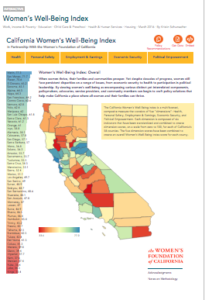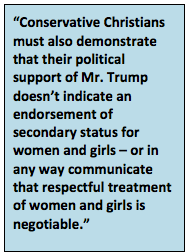Are you an elected official? A social service provider or advocate? Perhaps you’re a philanthropist deciding where your donation can make the most difference. 
Or maybe you’re just a run-of-the mill numbers nerd (like me).
If you’re any of the above, it’s well worth your time to dive into the data in the Women’s Well-Being Index – and check out how women and girls are faring in California.
An update of the online Index – developed by the California Budget and Policy Center in partnership with the Women’s Foundation of California – was released in a webinar this week.
CBPC’s Senior Policy Analyst Kristin Schumacher took the lead to develop the Index and accompanying issue briefs in four areas: Work Supports, Boosting Income, Building Wealth, and Safety Net.
What makes the Index particularly powerful is that it provides data for all 58 California counties, with multiple indicators for women’s health, personal safety, employment and earnings, economic security, and political empowerment.
The Index also ranks counties, and you can download county fact sheets.
For Sacramento, where I live, I learned we rank in the top 10 for only one indicator: mental health status. Just over 7 percent of women age 18 and over experienced serious psychological distress in the past year, placing us 7th out of the state’s 58 counties.
On a far less positive note, Sacramento ranked in the bottom 10 on 3 indicators: women’s commute time (52nd), hospital visits due to assault (52nd), and neighborhood safety (49th), the percentage of women who feel safe in their neighborhood all or most of their time.
Some of the Index’s statewide findings are especially alarming: In every age group, California women are more likely than men to live in poverty. And poverty is significantly greater for women who are African American (21.4%), Native American (21.3%); and Latinx (18.3%) than for women who are Asian & Pacific Islander (11.7%) or white (10.4%).
And consider these statistics for single mothers: On average, 60% of a single mom’s median income is needed to pay fair market rent, and 67.2% is needed for child care for an infant and school-age child.
Surina Khan, who directs the Women’s Foundation of California, points out that these “combined costs for housing and child care add up to more than 100% of median income in every county in California – which means there is nothing left over for other basic necessities like food, transportation and clothing. That’s why people are going into debt.”
Be sure to check out the Women’s Well-Being Index. You don’t have to be a numbers nerd to realize it’s a terrific tool for research, policy analysis and understanding more about the lives of women and girls in California.


